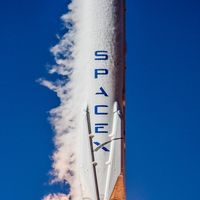The Shadow of Power: Elon Musk and the Department of Government Efficiency
April 29, 2025, 5:24 pm

Location: United States, District of Columbia, Washington
Employees: 5001-10000
Founded date: 2002
Total raised: $7.53B

Location: United States, Texas, Austin
Employees: 10001+
Founded date: 2003
Total raised: $3.86B
In the heart of Washington, a storm brews. The Department of Government Efficiency (DOGE) stands at the center, a whirlwind of change and controversy. At its helm, Elon Musk, a titan of industry, has wielded unprecedented influence over federal operations. But as he prepares to step back, the implications of his tenure ripple through the corridors of power.
Musk's DOGE was born from a vision. A vision to streamline government, to cut the fat, and to make the federal machine run like a well-oiled Tesla. The goal was clear: efficiency. But the methods? They have sparked a firestorm of debate. Critics argue that Musk's approach is akin to a bull in a china shop, leaving shattered pieces in its wake.
The Cabinet, once tethered to Musk's whims, is poised for a power shift. With Musk stepping back, the reins of DOGE will loosen. Cabinet members are ready to reclaim their authority, to limit the influence of the young engineers Musk brought into the fold. These engineers, fresh-faced and inexperienced, may soon find themselves under a microscope. Their qualifications will be scrutinized, their decisions questioned. The Cabinet is ready to reassert control, to steer the ship back on course.
Yet, the changes Musk initiated are not so easily undone. Like a train that has left the station, the cuts and restructuring he championed are already in motion. Agencies have internalized these drastic measures. The momentum is undeniable. Even as Musk fades from the spotlight, the policies he championed will continue to echo through the halls of government.
Musk's departure raises questions. Who will lead DOGE in his absence? Amy Gleason, the acting administrator, is a potential candidate. But clarity is needed. The ambiguity surrounding Musk's role has long been a source of confusion. As he transitions to a part-time role, the need for clear leadership becomes paramount.
The political landscape is shifting. Democrats are circling like sharks, accusing Musk of using his government position for personal gain. A recent Senate report alleges that Musk has evaded oversight and derailed investigations that could have cost him billions. The memo details potential liabilities exceeding $2 billion across his companies—Tesla, SpaceX, Neuralink, The Boring Company, and xAI. These figures are staggering, painting a picture of a man who may have manipulated his influence to sidestep accountability.
The report claims that as of Inauguration Day, Musk faced 65 potential regulatory actions from 11 federal agencies. These threats have been neutralized under the auspices of DOGE. The implications are profound. Critics argue that Musk's actions reflect a pattern of self-enrichment, a strategic maneuver to avoid obstacles in his path. The silence surrounding these dealings is deafening, and many fear it is a dangerous precedent.
The White House, however, pushes back against these allegations. Officials insist that Musk's role has not been about personal gain. They argue that DOGE operates with autonomy, that the Cabinet has always held the reins over spending cuts. Yet, the reality is more complex. The intertwining of Musk's business interests and his government role raises eyebrows. The potential for conflict is palpable.
As the dust settles, the future of DOGE remains uncertain. Will the Cabinet reclaim its authority, or will the momentum of Musk's policies continue to shape the federal landscape? The answer lies in the coming weeks. The transition of power will be closely watched, a litmus test for the effectiveness of the Cabinet without Musk's guiding hand.
Public sentiment is divided. Supporters of DOGE hail its efficiency, praising the cuts that have streamlined government operations. Detractors, however, see a dismantling of essential services, a government that has turned its back on the people it serves. Protests have erupted, with demonstrators voicing their discontent outside Tesla dealerships and government buildings. The clash of ideologies is palpable, a battle for the soul of government efficiency.
In this high-stakes game, the stakes are enormous. The balance of power is shifting, and the implications of Musk's influence will be felt for years to come. As the Cabinet prepares to take back control, the question remains: can they steer the ship without capsizing it? The future of DOGE hangs in the balance, a delicate dance between efficiency and accountability.
In the end, the story of DOGE is a microcosm of a larger narrative. It reflects the intersection of business and government, the complexities of power, and the ever-present struggle for control. As Musk steps back, the question lingers: will the legacy of his tenure be one of progress or peril? The answer is yet to be written, but the ink is already flowing. The next chapter awaits.
Musk's DOGE was born from a vision. A vision to streamline government, to cut the fat, and to make the federal machine run like a well-oiled Tesla. The goal was clear: efficiency. But the methods? They have sparked a firestorm of debate. Critics argue that Musk's approach is akin to a bull in a china shop, leaving shattered pieces in its wake.
The Cabinet, once tethered to Musk's whims, is poised for a power shift. With Musk stepping back, the reins of DOGE will loosen. Cabinet members are ready to reclaim their authority, to limit the influence of the young engineers Musk brought into the fold. These engineers, fresh-faced and inexperienced, may soon find themselves under a microscope. Their qualifications will be scrutinized, their decisions questioned. The Cabinet is ready to reassert control, to steer the ship back on course.
Yet, the changes Musk initiated are not so easily undone. Like a train that has left the station, the cuts and restructuring he championed are already in motion. Agencies have internalized these drastic measures. The momentum is undeniable. Even as Musk fades from the spotlight, the policies he championed will continue to echo through the halls of government.
Musk's departure raises questions. Who will lead DOGE in his absence? Amy Gleason, the acting administrator, is a potential candidate. But clarity is needed. The ambiguity surrounding Musk's role has long been a source of confusion. As he transitions to a part-time role, the need for clear leadership becomes paramount.
The political landscape is shifting. Democrats are circling like sharks, accusing Musk of using his government position for personal gain. A recent Senate report alleges that Musk has evaded oversight and derailed investigations that could have cost him billions. The memo details potential liabilities exceeding $2 billion across his companies—Tesla, SpaceX, Neuralink, The Boring Company, and xAI. These figures are staggering, painting a picture of a man who may have manipulated his influence to sidestep accountability.
The report claims that as of Inauguration Day, Musk faced 65 potential regulatory actions from 11 federal agencies. These threats have been neutralized under the auspices of DOGE. The implications are profound. Critics argue that Musk's actions reflect a pattern of self-enrichment, a strategic maneuver to avoid obstacles in his path. The silence surrounding these dealings is deafening, and many fear it is a dangerous precedent.
The White House, however, pushes back against these allegations. Officials insist that Musk's role has not been about personal gain. They argue that DOGE operates with autonomy, that the Cabinet has always held the reins over spending cuts. Yet, the reality is more complex. The intertwining of Musk's business interests and his government role raises eyebrows. The potential for conflict is palpable.
As the dust settles, the future of DOGE remains uncertain. Will the Cabinet reclaim its authority, or will the momentum of Musk's policies continue to shape the federal landscape? The answer lies in the coming weeks. The transition of power will be closely watched, a litmus test for the effectiveness of the Cabinet without Musk's guiding hand.
Public sentiment is divided. Supporters of DOGE hail its efficiency, praising the cuts that have streamlined government operations. Detractors, however, see a dismantling of essential services, a government that has turned its back on the people it serves. Protests have erupted, with demonstrators voicing their discontent outside Tesla dealerships and government buildings. The clash of ideologies is palpable, a battle for the soul of government efficiency.
In this high-stakes game, the stakes are enormous. The balance of power is shifting, and the implications of Musk's influence will be felt for years to come. As the Cabinet prepares to take back control, the question remains: can they steer the ship without capsizing it? The future of DOGE hangs in the balance, a delicate dance between efficiency and accountability.
In the end, the story of DOGE is a microcosm of a larger narrative. It reflects the intersection of business and government, the complexities of power, and the ever-present struggle for control. As Musk steps back, the question lingers: will the legacy of his tenure be one of progress or peril? The answer is yet to be written, but the ink is already flowing. The next chapter awaits.